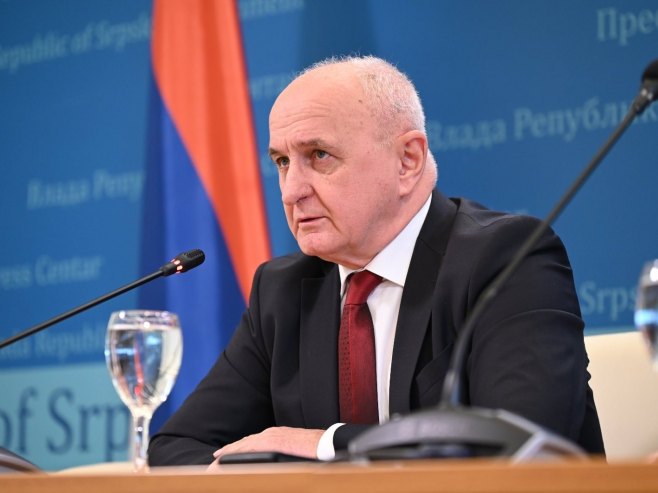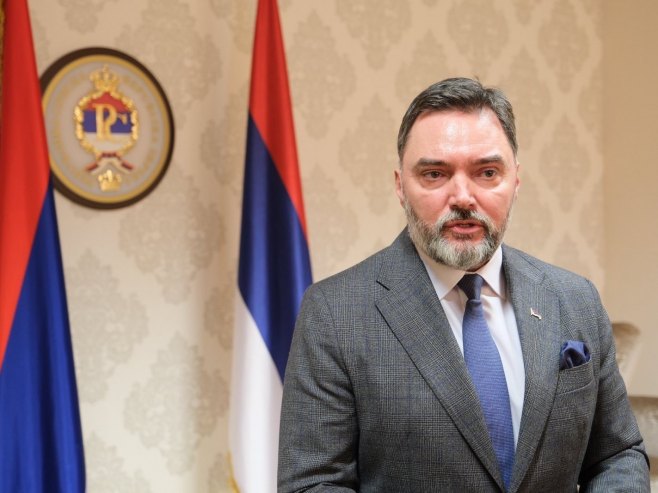Professor of constitutional law, Siniša Karan, emphasized that the controversial “Srebrenica Resolution” represents nothing less than another direct attack by global powers and the Bosniak establishment on the Republika Srpska and the Serb people.
Karan explained that since its creation on January 9, 1992, Republika Srpska has been an obstacle to those advocating for a unitary and unconstitutional BiH in the heart of Europe.
“We witness daily accusations that Republika Srpska and its officials violate the Dayton Agreement, while on the other hand, we see the actual unpacking of this same agreement by Bosniak political representatives and some diplomats based in Sarajevo, imposing decisions, and unilateral and arbitrary actions without any dialogue or consensus,” highlighted Karan.
He stressed that Republika Srpska advocates for the original Dayton, the letter of the Dayton agreement, and its constitutional frameworks and norms that created BiH after the dissolution of former Yugoslavia, while on the other side, there are numerous, documented attempts to dismantle the Constitution of BiH by force.
“In BiH, there is a discrepancy between the normative and the actual that has reached its climax, so we can frankly state that we live in a para-constitutional state or a state without a constitution,” said the professor of constitutional law to Srna, adding that there is no institution that Bosniaks, with wholehearted support from foreigners, do not attempt to privatize—from judicial institutions, the Ministry of Foreign Affairs in the Council of Ministers, to the Presidency and permanent missions.
Karan pointed out that the adoption of the “Srebrenica Resolution” would be the final act of political anti-Dayton activities concerning the constitutional order of BiH and would call into question its further existence and survival.
“The draft of this resolution is an attack on the autonomy of BiH’s institutions, on the decision-making process in joint institutions. This is merely a path to creating a unitary state which can be interpreted as majoritarianism, in terms of converting BiH into the property of only one nation and branding Republika Srpska as a genocidal creation and the Serb people as a genocidal nation,” noted the professor of constitutional law.
The intentions of the initiators of drafting this so-called resolution and its potential passing, Karan said, are very clear, cunning, and transparent and lead only to one thing—to assign a “label” to the Serb people that not even Germany carried, despite all the atrocities it committed in the 20th century, and today it shamelessly appears as one of its proposers.
Reminding of the genocide committed by Germany in Namibia, Karan mentioned that historical records confirmed that German general Lothar von Trotha, sent to Africa to suppress the Herero people’s uprising in 1904, ordered his troops to exterminate the entire tribe.
At that time, according to historical data, about 65,000 members of the Herero people and at least 10,000 members of the Nama people were killed, emphasizing that evil cannot be buried by oblivion as if it never existed, for there are historical facts and data.
“And when we recall World War II and the consequences of the greatest evil of the 20th century—fascism, whose rehabilitator is precisely the Bavarian Christian Schmit sitting in Sarajevo falsely presenting himself as the High Representative. Fascists then killed about 60 million people. During World War II, Germany committed genocide against the Serb population, killing between 900,000 and 1,200,000 Serbs in the NDH and the rest of occupied Yugoslavia.
The official report of the Democratic Federative Yugoslavia, later the Federal People’s Republic of Yugoslavia, published on May 26, 1945, states that the total number of war victims (people of all nationalities, killed or died as a result of the war) amounts to 1,685,000, and later the then State Commission tasked with determining war crimes in Yugoslavia established that the number of war victims was 1,706,000,” stated Karan.
He added that the communist government openly concealed the fact of Serb suffering in World War II, which bore the greatest sacrifice, thus the narrative highlighted the suffering of people and nationalities, including hiding mass graves like Prebilovci, Kozara, Stari Brod, Sajmište in Belgrade, Pag…
“The greatest sacrifice in both World War I and World War II, as well as the last Defensive-Patriotic War, was borne by the Serbs. That is why they are a nuisance today to the descendants of fascists, and thus another venomous mechanism has been activated against the Serb people and Republika Srpska, aiming for the unitarizationof BiH and the anathematizing of the Serb antifascist and liberty-loving people!” emphasized Karan.
“Modeling ‘truth’,” he continued, “was and is still being conducted through selective, biased, and non-objective work in the field of researching and documenting criminal acts of war crimes by judicial institutions of BiH, exploiting the fact that the issue of justice, fairness, legal state, rule of law, and the right to a fair trial in BiH is not just a matter of judiciary but a fundamental issue of the being and functioning of the country.”
“In this regard, it should be noted that both the Court and the Prosecutor’s Office of BiH have essentially drafted a new political system in BiH through selective prosecution to the detriment of one nation. From 2005 to 2011, the Prosecutor’s Office of BiH charged 189 individuals, including: 132 Serbs, 26 Croats, and 31 Bosniaks, while the total number of individuals convicted both definitively and non-definitively in the Court of BiH was: Serbs 1,093 years and nine months, Croats 161 years and six months, and Bosniaks 129 years,” Karan pointed out.
He reminded of the Report of the Independent International Commission for the Investigation /led by Israeli historian Gideon Greif/ of the suffering of all peoples in the Srebrenica region from 1992 to 1995, which clearly established the proportion of victims on all sides, as well as that the term ‘genocide’ for Srebrenica is incorrect and unacceptable.
According to his words, this report presents a comprehensive and truthful view of the wartime events in the Srebrenica region, and in BiH as a whole, contributing to strengthening trust and tolerance among the peoples in BiH, ultimate reconciliation, and coexistence of current and future generations.
Given the far-reaching consequences of possibly adopting such a resolution, which inevitably leads to a political confrontation with members of the Serb nation, the institutions of Republika Srpska will provide a resolute response to this unprecedented act that would brand an entire people.
“The goal of falsely imposing the labels ‘genocidal creation’ and ‘genocidal people’ is more than clear and thus the response of the institutions of Republika Srpska will be clear and decisive,” concluded Karan.
Sourcce: RTRS









